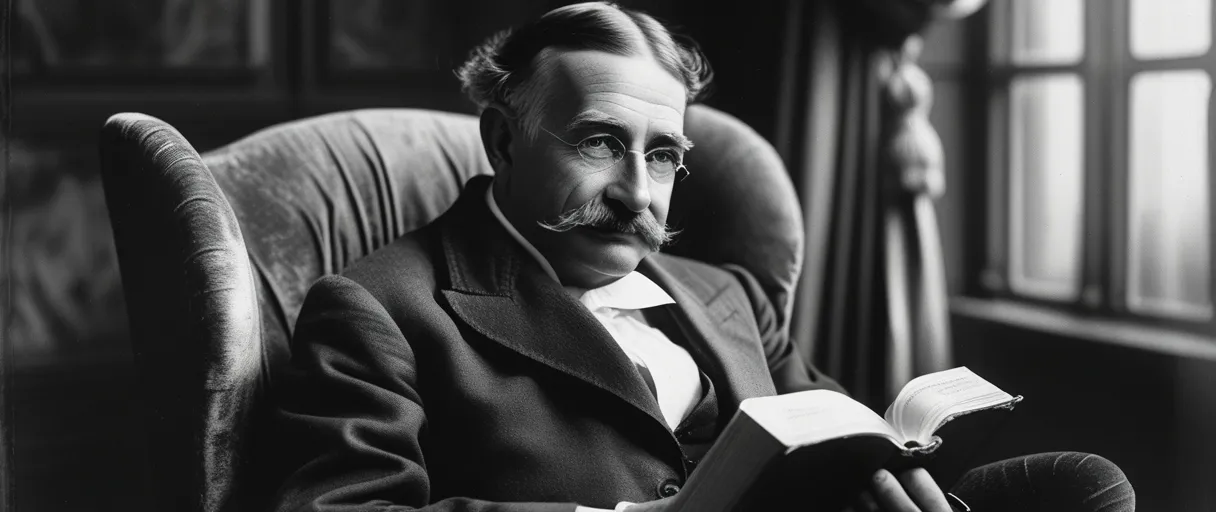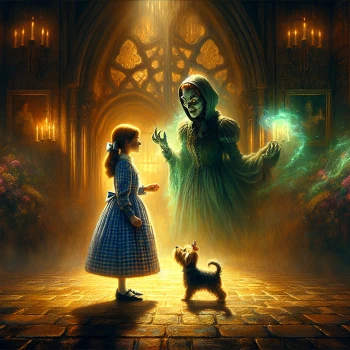
Lynam Frank Baum
Lynam Frank Baum was an influential American author whose imaginative children's tales, notably "The Wizard of Oz," critiqued social norms and celebrated individual moral autonomy.
Notable Works
Lynam Frank Baum is best known for his beloved classic, "The Wizard of Oz," a timeless work of children's literature that has charmed readers of all ages for generations. Baum's enchanting tale seamlessly blends elements of fantasy and adventure, inviting readers into a captivating world filled with vivid characters, magic, and imagination. Central to Baum's storytelling is the exploration of themes such as courage, the meaning of home, and the value of friendship and self-discovery. Among the unforgettable characters he created are Dorothy Gale, the spirited young heroine, and her loyal companions—the Scarecrow, Tin Woodman, and Cowardly Lion—whose journeys touch upon themes of personal growth and self-awareness. Baum's work continues to resonate due to its enduring lessons and rich, imaginative storytelling, making "The Wizard of Oz" an influential cornerstone in the fantasy genre and a cherished piece of literary history.
Books by Lynam Frank Baum
Overview & Analysis
Lynam Frank Baum was a celebrated American author best known for his imaginative children's literature, most famously "The Wizard of Oz." Baum's literary style combined whimsical fantasy and vivid storytelling to captivate readers, while subtly exploring deeper philosophical and social critiques. His works frequently employed symbolism and allegory, satirizing societal norms, class inequalities, and authoritarian tendencies. A proponent of individual moral judgment and ethical autonomy, Baum's narratives championed emotional honesty, sincerity, and intellectual freedom, encouraging readers to question established dogmas and reflect critically on personal and collective values. His pacifist beliefs and cautious stance towards capitalist morality and unchecked ambition were intricately woven into his stories, illustrating his commitment to the virtues of simplicity, community warmth, and tolerance. Baum's enduring influence lies in his ability to fuse accessible, entertaining storytelling with profound psychological and philosophical insights, leaving a lasting impact on generations of readers who continue to find inspiration and moral guidance in his timeless tales.
Back to TopInfluences & Worldview
Lynam Frank Baum was a philosophical thinker whose worldview celebrated individual moral judgment and ethical integrity over societal conformity. Deeply critical of class structures, Baum used his imaginative narratives to critique social norms, racial inequality, and authoritarian governance. Through symbolism, allegory, humor, and satire, he explored complex themes related to the pursuit of personal freedom, the dangers of unchecked ambition, and the virtues of simplicity and community warmth. Baum's stories often reflected his pacifist inclinations and his cautious stance towards institutional authority and capitalist morality. His writings emphasized internal moral evolution, advocating tolerance, intellectual freedom, emotional honesty, and sincerity. In both his literary creations and personal life, Baum consistently championed critical thinking and reason, urging readers to question established dogmas and embrace ethical autonomy. His enduring legacy lies in his ability to creatively weave profound psychological insight with accessible storytelling, inspiring generations of readers to reflect deeply on their own moral compass and societal values.
Relevant Historical Events
- Industrial Revolution (1760): Beginning in the late 18th century, the Industrial Revolution transformed economies from agrarian to industrial. In Russia, the effects were slower but still significant, leading to changes in labor, class structure, and urban growth—forces that influenced the aristocracy and education.
- Westward Expansion (1803 – 1890): The 19th-century movement in which settlers expanded U.S. territory westward across North America, driven by the ideals of Manifest Destiny, personal liberty, and economic opportunity. It reshaped American culture and geography, often at the expense of Indigenous peoples.
- American Gilded Age (1870 – 1900): A period marked by rapid economic growth, industrialization, immense wealth accumulation among the elite, and widespread social inequality and corruption in American society.
Notable Characters
Lyman Frank Baum is best known for creating imaginative, whimsical, and endearingly resilient characters, exemplified by Dorothy Gale, the determined young heroine of his beloved classic, "The Wizard of Oz." Dorothy embodies innocence, courage, and kindness as she navigates the fantastical Land of Oz, reflecting Baum's optimistic worldview and belief in the virtues of friendship, compassion, and perseverance. Alongside Dorothy, Baum introduced iconic companions such as the Scarecrow, who desires intellect, and the Tin Woodman, who longs for a heart, each character symbolizing human aspirations and inner journeys toward self-discovery and fulfillment.
Baum's characters often grapple with internal and external challenges, revealing the author's belief in personal growth and moral clarity as essential human qualities. The Cowardly Lion, for instance, despite his initial timidity, ultimately illustrates courage as an inherent, rediscovered trait rather than something external. Through these vividly crafted figures, Baum highlighted universal themes of self-belief, friendship, and the importance of home, mirroring early 20th-century American values and optimism prevalent during his lifetime.
Back to TopThemes of Focus
Lynam Frank Baum consistently explores themes of adventure, the quest for self-discovery, and the nature of courage throughout his work. His narratives often depict fantastical journeys that symbolize personal growth and transformation, emphasizing that true wisdom and bravery lie within oneself rather than external sources. Baum also delves into the contrast between appearance and reality, highlighting how characters frequently discover hidden strengths and virtues beneath deceptive surfaces.
Additionally, Baum examines the importance of friendship and cooperation, showing how collaboration and mutual support are crucial in overcoming trials. These secondary themes reinforce the primary ideas by underscoring the value of companionship on the journey toward self-awareness. Reflective of early twentieth-century American optimism and individualism, Baum's themes align with the cultural emphasis on self-reliance and personal fulfillment during his time, presenting narratives that resonate with both children and adults alike.
Back to TopLegacy & Impact
Lynam Frank Baum's literary legacy profoundly influenced both literature and social discourse, particularly through his imaginative storytelling and insightful social commentary. His work, most notably "The Wizard of Oz," has become a foundational piece in American literature, celebrated for its creative use of symbolism and allegory to critique social norms, class structures, and authoritarian governance. Baum's narratives consistently advocate for individual moral judgment, tolerance, intellectual freedom, and ethical autonomy, resonating deeply with readers across generations.
The enduring relevance of Baum's characters and themes is evident in their continued presence in popular culture, educational curricula, and scholarly analysis. His exploration of personal integrity, racial equality, and the dangers of unchecked ambition remain topical and widely discussed in contemporary society, demonstrating his stories' timeless appeal and capacity for adaptation.
Today, Baum's legacy is preserved through extensive adaptations in film, theater, and literature, ensuring his philosophical and ethical perspectives remain accessible. While largely celebrated, Baum's works have occasionally faced scrutiny and re-evaluation for their nuanced reflections of historical context and social attitudes. Nevertheless, his contributions to literature and social critique continue to inspire critical thought, academic inquiry, and cultural reflection.
Back to TopConclusion
Lynam Frank Baum's imaginative narratives remain profoundly relevant in contemporary society, continuing to resonate through their insightful exploration of individual morality, ethical autonomy, and social critique. By employing symbolism, allegory, humor, and satire, Baum challenged readers to question societal norms, confront inequalities, and reflect upon personal virtues such as sincerity, tolerance, and community warmth.
His distinctive worldview has significantly influenced literary traditions, inspiring writers to creatively address pressing societal issues within engaging, accessible storytelling frameworks. Baum's commitment to critical thinking, intellectual freedom, and emotional honesty underscores the timeless appeal of his work.
Readers today are encouraged to explore Baum's stories not only for their rich imaginative landscapes but also for their enduring capacity to provoke thoughtful reflection on personal ethics and societal values, ultimately guiding individuals toward deeper self-awareness and a more compassionate understanding of the world.
Back to Top